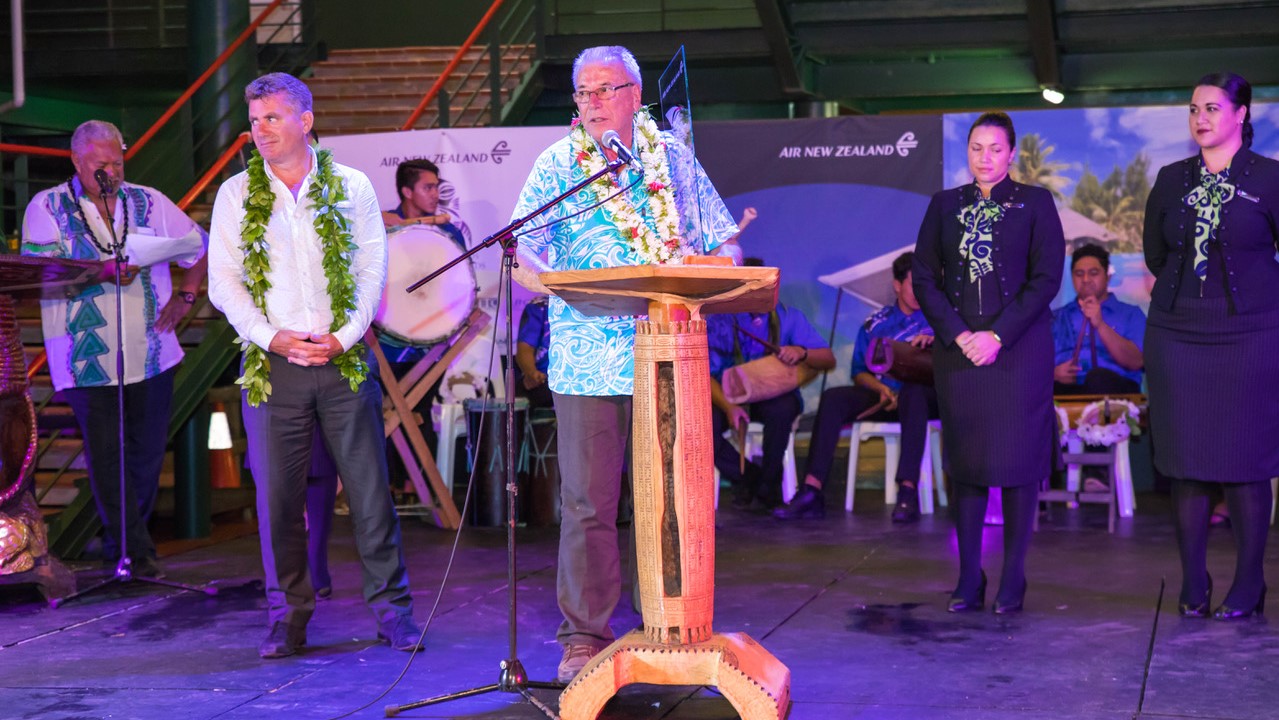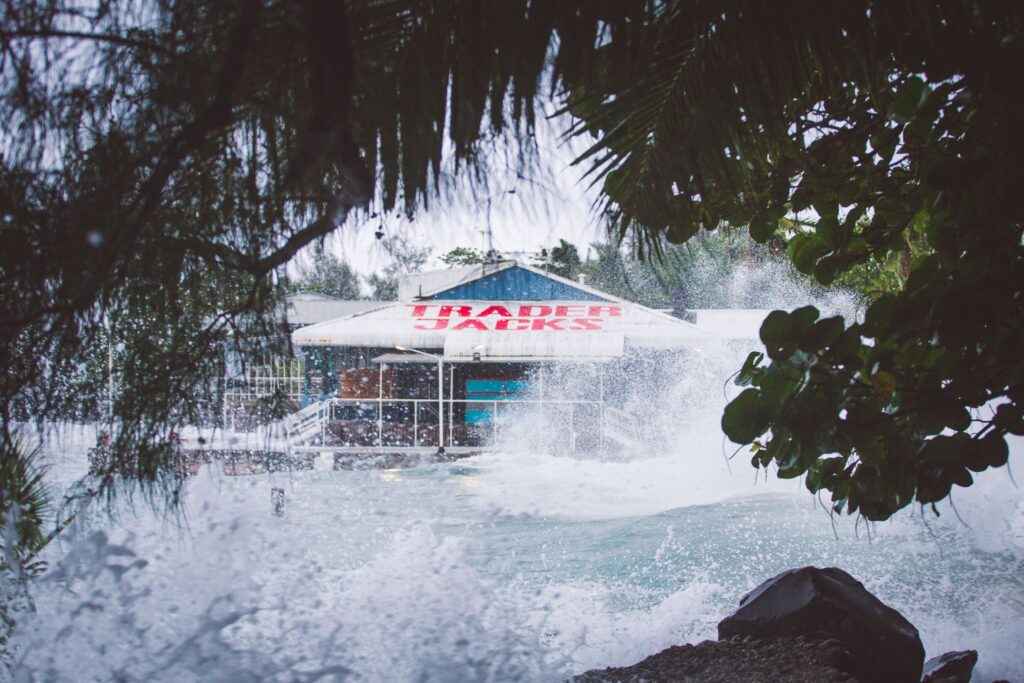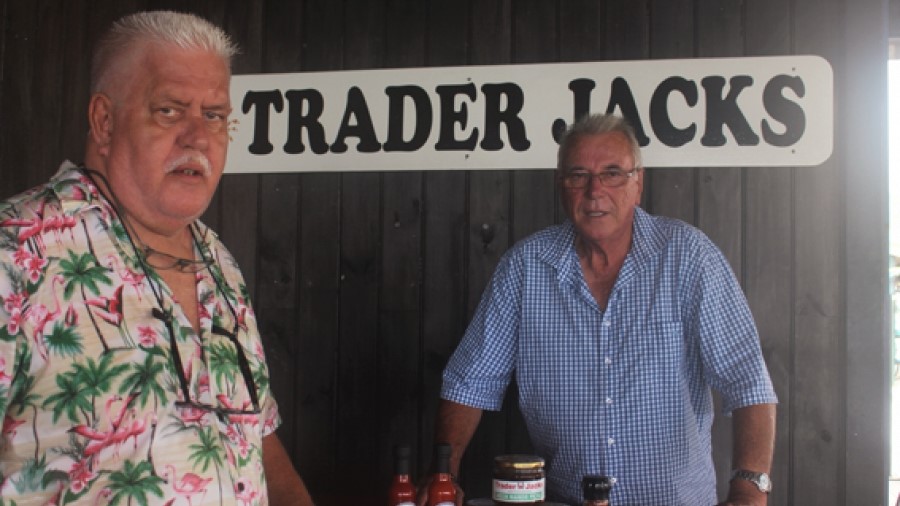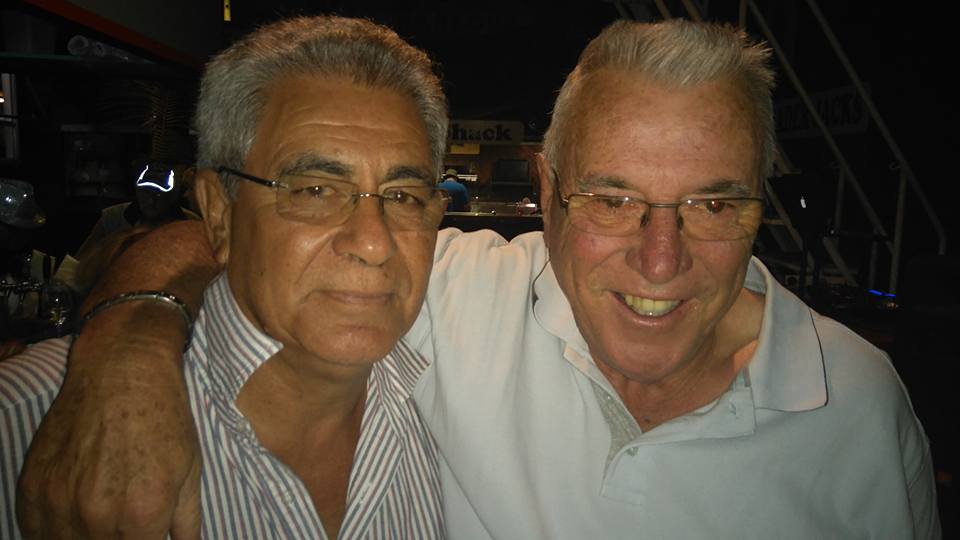Papa Jack Cooper: One of a kind
Saturday 11 June 2022 | Written by Derek Fox | Published in Local, National

Jack Cooper was handed a special individual award at the 201 Air New Zealand Cook Islands Tourism Awards for his outstanding contribution to tourism. Photo: ISLAND SUN (Alastair Blount)/2061029
Over my lifetime I’ve often heard people referred to as one of a kind, an icon the like of whom we may not see again. In most cases the rhetoric hasn’t been borne out by the facts – but in Jack Cooper’s case it may just be true, writes Derek Fox.
There was standing room only at Trader Jacks on Monday afternoon. It was the day the Queen’s birthday is celebrated, but that wasn’t the reason for the gathering.
Instead it was to mark the passing, and to celebrate the life of one of the country’s most famous adopted sons, Jack Cooper. The founder and proprietor of the iconic Trader Jacks restaurant and bar, which has been a feature on the waterfront at Avarua for nearly four decades. Ironically Monday’s wake was 36 years to the day that the original Traders opened on the 6th of June, 1986.
The mix of family, friends – some of whom had flown in from New Zealand especially, business associates, vaka paddlers, musicians, patrons and staff, shared their memories and stories about Jack. His long time life partner Rosa read out condolence messages from overseas friends who couldn’t make it.

So who was Jack Cooper.
He was born in Wellington, New Zealand in December 1946. He grew up in the south coast suburb of Island Bay where his mother Betty was a tailor, and specialised in making wedding dresses for the largish community of Italian brides-to-be who lived there. His father Raymond was a boilermaker. Jack’s late sister Claire was five years his senior.
He was named after an uncle Jack who he never met. Uncle Jack was a Spitfire pilot in World War Two and was killed when he accidently flew into high tension wires in Italy during the war. Jack always wanted to visit his grave but never made it.
He loved growing up in Wellington, loved the beaches and fishing spots and in later life became a very keen surfer, riding waves at New Zealand and Australian surfing spots.
Jack reckoned he once saved his whole family’s lives, and there’s some truth in that. He was seven years old, it was Christmas time and the family was due to catch the overnight express train to Auckland to spend time with family there. But Jack got mumps and they had to cancel their travel. As the express roared through the night enroute to Auckland a lahar was making its way down the Whangaehu river from the Mt Ruapehu crater lake. The train and the lahar reached the Tangiwai bridge at about the same time. The huge mud and rock flow took out the bridge and the train crashed into the river killing 151 people. The Tangiwai disaster of Christmas Eve 1953 is New Zealand’s biggest ever train accident.

Two years later the family moved to Auckland.
Jack wasn’t keen on school and couldn’t wait to leave. But he was keen on sport, especially Rugby League. He played through the grades for Ponsonby including Premiers. The rough and tumble of league probably came in handy later in his chosen vocation.
His mother wanted him to go to university, and saved up for him to do so, but he wasn’t interested. At 15 he left school and took on a motor mechanic apprenticeship. Two years later he reckoned he had that sussed and moved on again. He travelled extensively doing all sorts of work including on a drilling rig in the Gibson desert in Australia.
Along the way he eventually found the niche he had been looking for. Hospitality.
His first hospo job was serving food and drink at the Logan Park Motor Lodge in Auckland, working for an earlier generation restaurateur Bob Sell – who later spent the last decade of his life in Rarotonga – things developed from there.
Jack worked his way up through the ranks carrying trays, later running bars and managing hotels. Some of them were pretty tough places with gang patrons who weren’t above converting a heavy glass jug into a good weapon to hit someone on the head with. Breaking up such altercations and stopping others from starting were all part of the job.
In the early 1980s he found himself at a bit of a loose end and was contemplating what to do next when prominent Auckland lawyer Paul Temm QC, asked him to come to Rarotonga and have a look at the operation of the Rarotongan resort. At the time Temm was the chair of the consortium that owned the Rarotongan and he wasn’t happy with the way it was being run.

Jack arrived here in January 1983. If Temm wasn’t happy about things, neither was the management company running the hotel happy about the Kiwi sent up to check them out. One thing led to another, Temm was replaced as chair and eight weeks after his arrival Jack was out of a job.
But he’s never been one to allow adversity to defeat him, instead he tends to turn it into an opportunity – in this case the Vaima restaurant. Jack took over the Vaima and began to apply all those skills and learnings he’d picked up during his hospo journey, this time on his own account. It was the beginning of what was to become his subsequent remaining life love affair with this country.
Through the Vaima, Jack teamed up with a fellow Kiwi who was to become a business partner for the rest of his life, Chris Douglas. Chris has Taranaki and Tainui whakapapa, and while still in his teens took an interest in cooking and held down a weekend job in a restaurant in New Plymouth. He calls himself a ‘cook not a chef’. From that early start he graduated to become something of an expert in catering, especially for film crews; and arrived in these islands about the same time as Jack running the catering for the movie ‘The Silent One’.
With the filming over Chris was having a couple of weeks break before heading back to NZ when Jack asked him if he could look after the Vaima for a couple of weeks, while he went down to New Zealand. He agreed and they’ve been together ever since. Chris jokes that he and Jack have been partners longer than most married couples.
While the Vaima was working out ok, Jack wasn’t satisfied. It’s position on the south coast of Rarotonga for one thing, it’s distance from Avarua. He and Chris wanted something in or closer to town – by the water. Eventually their attention was drawn to an overgrown rubbish littered piece of reclaimed land. Chris recalls the day. They got a step ladder and climbed up and looked at then videoed the view, out towards the Avarua passage through the reef – it was love at first sight. There were still many obstacles to overcome and hoops to jump through. But on the 6th of June 1986 Trader Jacks opened. Jack recalls that hundreds of people turned up and the stayers partied till dawn. Trader Jacks quickly became very popular with locals and visitors alike.

But in January 1987 Cyclone Sally visited, bringing winds of up to 190kph and waves up to 12-metres high, 80 per cent of the buildings in Avarua were either destroyed or badly damaged. Trader Jacks sitting directly in the path of the storm was one of them. Jack was insured but he says it took the insurance company 15 months to pay out, in the meantime his tenacity and powers of persuasion came to the fore, and friends and business people loaned him the money to get up and running again.
While Trader Jacks location right on the Avarua harbour is stunning, Sally demonstrated its vulnerability and it became uninsurable.
That issue would manifest itself 18 years later when Cyclone Meena, followed by three further cyclones in four weeks, struck Rarotonga and the restaurant again. There is a spectacular picture of a wave breaking over the roof of the two-plus storey building. Jack said while Sally was a disaster, Meena was devastating and cost a million dollars to recover from. Many people would have walked away, but not Jack. Once again tenacity, planning and perseverance took over, and Trader Jacks rose out of the debris again.
I first met Jack about 25 years ago. It was post-Sally and pre-Meena and Trader Jacks was pumping. It was all the things that Jack wanted it to be. A place where locals and tourists could kick back and relax. Tourists on their holidays and locals enjoying a drink or three after work and before heading home. Sitting in the bar on a week afternoon at 4pm you could see the town workers streaming across the street to Jacks. They were halcyon days for Jack and he was the star of the show.
He gave most of his friends and associates a nick name. Some were fairly predictable, mine was Foxy with a suffix one shouldn’t use in polite company. My wife Jaewynn’s was Chatterbox – rather astute I thought; there are others I daren’t mention. Jack was sharp and witty, well read and followed world events. He certainly hadn’t allowed his lack of schooling to get in the way of his education. He could also be a bit rude and crude on occasion, and while some took offense, surprisingly most punters seemed to love it and came back for more.

Over my lifetime I’ve often heard people referred to as one of a kind, an icon the like of whom we may not see again. In most cases the rhetoric hasn’t been borne out by the facts; but in Jacks case it may just be true.
Jack had many many friends from these islands and around the world, I dare not try and mention them by name for fear of missing out someone I should really include. I will mention that he is survived by three daughters and his Pukapukan partner Rosa. I know not how many mokopuna.
Jack was born on the 8th of December 1946, he died on June the 1st 2022. On Tuesday, June 7th, he was laid to rest alongside his dear friend John Kenning who died in November 2016. Both papa’a men came to this country, fell in love with it and the people and made it their home; to the extent that they were granted the privilege of being buried here.
On Sunday last weekend, I was sitting at home when I received a phone call from a good mate who happens to be an Air New Zealand Captain. He was at the airport and was lamenting the fact that he couldn’t make it to see off his long time mate Jack, with whom he’d shared a Bombay or two in the past. He couldn’t even come out of the aircraft and airport to meet me.
Later that afternoon as the 787 aircraft lifted off and climbed out to head back to Auckland, as it crossed over Trade Jacks I thought I saw it’s wings waggle. I might have imagined it, or there may have been a gust of wind at that moment. But then again it might have just been a tribute to Jack. RIP Trader.















































